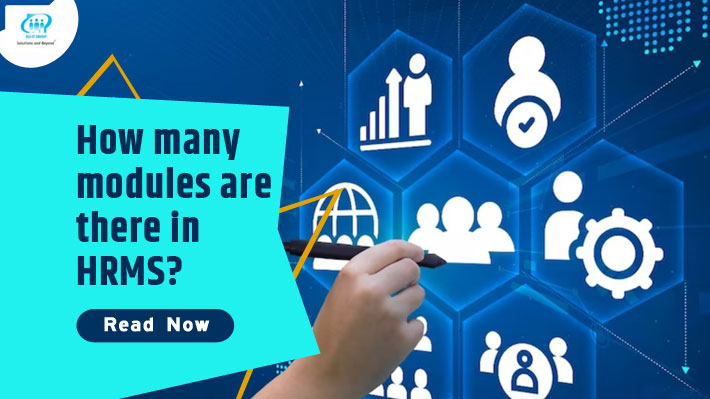Unlock the power of HRMS software: Explore the many modules that streamline HR operations and transform your workplace efficiency. Discover the key modules you need today!
In today’s rapidly advancing business scene, Human Resource Management Systems (HRMS) have become pivotal tools for organizations of all sizes. HRMS software not only streamlines HR operations but also progresses overall workforce administration. One essential perspective of HRMS software is the presence of different modules that cater to distinctive HR functions.
In this article, we are going to dig into the world of HRMS modules, looking at their significance and how they contribute to capable HR management.
The Core Modules
The core modules of an HRMS system shape the backbone of successful HR administration. These vital components streamline fundamental HR capacities, guaranteeing organizational cohesion and effectiveness.
- Employee Information Management: This module includes personal information, contact details, work history, performance evaluations, and more. Employee Information Management ensures easy access to employee data, streamlining various HR tasks such as onboarding, promotions, and transfers.
- Payroll Management: This module automates the calculation of salaries, taxes, deductions, and other financial aspects of employee compensation. A robust payroll software ensures accurate and timely payments, reducing the likelihood of errors and compliance issues.
- Time and Attendance Management: Efficient time and attendance management are essential to monitor employee attendance, working hours, and leave requests. This module helps in tracking attendance, managing shifts, and calculating overtime, ensuring employees are compensated fairly for their time.
- Leave Management: Leave Management simplifies the process of requesting and approving leaves. It allows employees to submit leave requests, which can then be reviewed and approved by managers. This module ensures compliance with leave policies and helps prevent scheduling conflicts.
Talent Management Modules
In the realm of HRMS, Talent Management Modules stand as the catalysts for nurturing employee potential and driving organizational excellence. Let’s explore their pivotal role.
- Recruitment Management: Recruitment Management assists in the entire hiring process, from posting job vacancies to onboarding new employees. It helps HR teams attract, screen, and select the best candidates efficiently, saving time and resources.
- Performance Management: Performance Management modules enable organizations to set goals, conduct performance appraisals, and provide feedback to employees. They help align individual and organizational objectives, fostering a culture of continuous improvement.
- Training and Development: Employee development is crucial for organizational growth. Training and Development modules track training needs, schedule courses, and monitor employee progress. They help employees acquire new skills and stay updated in their respective fields.
Employee Self-Service and Managerial Modules
In the modern HR landscape, Employee Self-Service (ESS) and Managerial Self-Service (MSS) modules are revolutionizing how HR tasks are managed, empowering employees and enhancing managerial oversight.
- Employee Self-Service (ESS): ESS modules empower employees to manage their HR-related tasks, such as updating personal information, viewing pay stubs, and applying for leave. This self-service ability reduces the administrative burden on HR teams and also enhances employee satisfaction.
- Managerial Self-Service (MSS): MSS modules provide managers with tools to oversee their teams effectively. They can review team performance, approve leave requests, and access relevant HR data to make informed decisions.
Compliance and Reporting Modules
In the realm of HRMS software, compliance and reporting modules play a pivotal role in ensuring legal adherence and providing invaluable insights for strategic decision-making.
- Compliance Management: Ensuring compliance with labour laws and company policies is essential. Compliance Management modules help organisations stay up-to-date with legal requirements, track employee certifications, and manage audits effectively.
- Reporting and Analytics: Data-driven decision-making is a hallmark of modern HR. Reporting and Analytics modules provide insights into various HR metrics, helping organizations identify trends, improve processes, and make informed strategic decisions.
Additional Modules
In addition to the core and talent management modules, HRMS systems offer a range of “Additional Modules” designed to address specific HR challenges and enhance overall workforce management.
- Benefits Administration: This module helps manage employee benefits such as health insurance, retirement plans, and wellness programs. It streamlines benefits enrollment, tracks costs, and ensures employees receive the benefits they are entitled to.
- Expense Management: Expense Management modules simplify the process of submitting and approving employee expenses. It includes travel expenses, reimbursements, and other financial transactions related to employees.
- Employee Engagement: Employee Engagement modules facilitate surveys, feedback collection, and sentiment analysis to gauge employee satisfaction and engagement levels. This data is valuable for enhancing workplace culture and retention.
In today’s competitive business landscape, investing in a robust HRMS system with the right modules can significantly contribute to an organization’s success. As technology continues to advance, we can expect HRMS software to evolve further, offering even more sophisticated and user-friendly modules to meet the ever-changing needs of the HR industry.
To know more you can contact us at info@dli-it.com.
